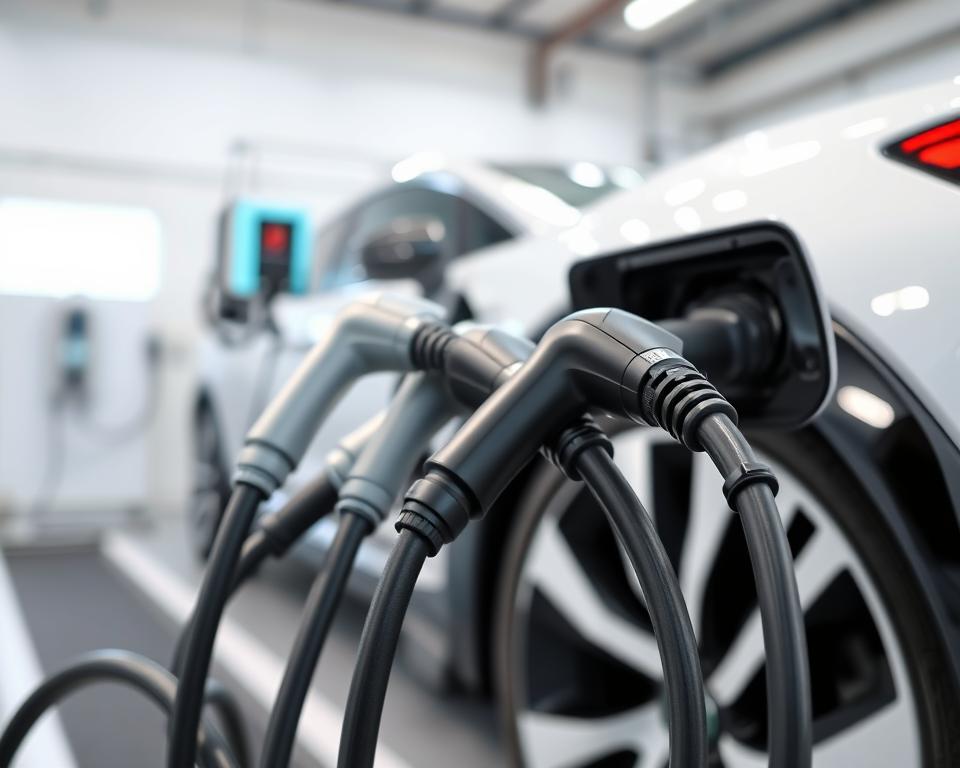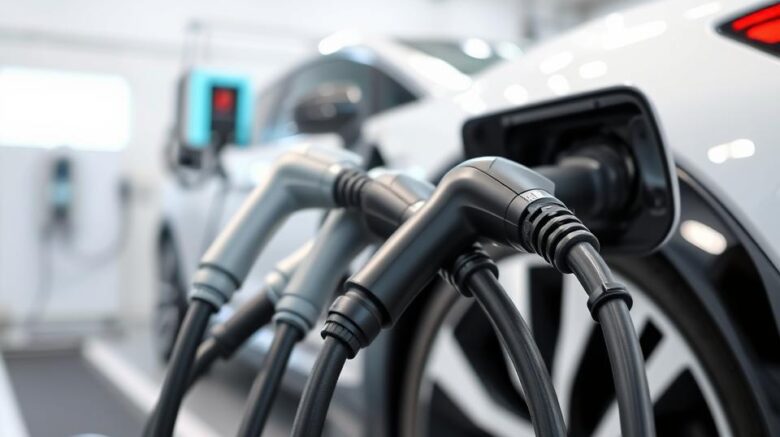Leading EV Charging Cable Manufacturers for Your EV
The electric vehicle industry is on the rise, with the demand for dependable and high-performance charging solutions surging. Today, industry leaders have been at the cutting edge of this change, providing top-tier charging infrastructure. Southwire, for instance, entered the market in 2014 and excels, boasting over 1000 five-star reviews and 75 years of experience in the electrical construction industry.
The rise in electric vehicle adoption creates a requirement for durable, quick, and secure EV Charger Manufacturers. Key suppliers are developing to address changing requirements, offering products that boost the overall charging experience.
Knowing the differences between various charging solutions is crucial for choosing correctly. High-grade charging infrastructure directly influences vehicle performance and user experience.
Core Lessons
- Leading brands provide premium cables that boost durability and security.
- Growing EV adoption fuels demand for fast, reliable infrastructure.
- Leading companies innovate to meet the evolving needs of electric vehicle owners.
- Quality charging cables directly impact charging efficiency and vehicle performance.
- Investing in quality charging infrastructure is beneficial in the long run.

The Growing Importance of Quality EV Charging Cables
As electric vehicles become increasingly popular, the importance of high-quality EV charging cables is undeniable. The efficiency, security, and reliability of electric vehicle charging systems depend heavily on the quality of the charging cables used.
The Evolution of Electric Vehicle Charging Technology
Charging tech for EVs has evolved rapidly, with a shift toward faster charging speeds and improved safety features. Today’s EV charging cables are designed to meet these evolving needs, featuring superior materials and construction techniques to minimize energy waste and maximize charging efficiency.
Quality’s Impact on EV Charging
Premium cables enhance both safety and functionality in EV systems. Durable features, such as all-weather performance and temperature tolerance, ensure reliable operation across various environments. Moreover, regulatory compliance and following protocols are essential in guaranteeing safe operation.
| Key Features | Benefits |
|---|---|
| Superior materials and construction | Reduced energy waste |
| Enhanced durability features | All-weather reliability |
| Regulatory compliance | Rigorous safety requirements met |
| Serviceability | Repairable design for longevity |
Aichie Tech Electronics’ premium cables undergo rigorous testing at The Cable Lab. With repairable Portable EV Charger, users can save hundreds over a decade by choosing repairs over replacements, lowering environmental impact.
Top EV Charging Cable Manufacturers in China
China is home to a growing number of EV charging cable manufacturers. These companies are crucial in supporting the expanding electric vehicle (EV) market, providing high-quality automotive cables designed for various charging needs.
Wottz – Pioneers in EV Cables Since 2014
Wottz has been a leading cable manufacturer since 2014. They offer a range of cables that cover Mode 1–4 charging standards, from Mode 1, 2, 3, and DC Fast Charging (Mode 4).
Aichie Tech Electronics – 75 Years in Electrical Solutions
Aichie Tech Electronics’ seven-decade legacy informs its premium cable designs. Their products are built for residential and commercial applications.
Additional Key Cable Suppliers
Beyond industry leaders like Wottz and Southwire, other manufacturers are making their mark by focusing on specific automotive applications or technological innovations in electric vehicle charging. These include specialists in Type 1 (J1772) and Type 2 (Mennekes) connectors, as well as brands innovating in cable durability and adaptability.
Understanding Different Types of EV Charging Cables
As electric vehicles become increasingly popular, understanding the various types of EV Charging Cable Manufacturers is crucial for optimal charging experiences. Different cables suit different charging needs. The diversity in EV charging infrastructure necessitates a closer look at the cable options.
Type 1 vs Type 2 Explained
SAE J1772 (Type 1) and Mennekes (Type 2) are the main global standards. Type 1, also known as SAE J1772, is North American standard, while Type 2, or Mennekes, is the European norm. The choice between these cables depends on the vehicle’s connector type and the charging station’s compatibility. Type 2 cables often support higher charging capacities, making them ideal for speed.
Level 2 & Fast DC Cables
Level 2 AC cables charge faster, up to 19.2 kW. DC Fast Charging cables, on the other hand, enable quick top-ups by on-site AC→DC conversion, delivering rapid fill-ups. These cables are key for highway charging, enabling drivers to recharge quickly.
Portable vs Fixed Cables
Granny chargers plug into home outlets for emergency use. Tethered cables are fixed to charging stations, providing a convenient but less flexible charging solution. The choice comes down to flexibility vs convenience.
Cable length, power rating, and connector type matter most. For instance, portable charging cables range from simple L1 cords to full L2 kits. Vehicle-to-load (V2L) cables let EVs act as mobile power banks.
- Flexible granny chargers and L2 units suit various needs.
- Fixed cables add convenience, removing cable management tasks.
- Lengths vary from 5 m to 50 m—choose wisely.
Attributes of Premium EV Cables
High-quality EV charging cables are distinguished by several key features that ensure reliable and safe charging. These features are crucial for maintaining the integrity of the charging process and safeguarding the vehicle and user.
All-Weather Durability
Durability and weather resistance are paramount in EV charging cables. Manufacturers like Wottz and Southwire craft their cables from recyclable materials that adhere to ROHS compliance, ensuring they withstand various environmental conditions. Their repairable builds support longevity and eco-reuse.
Flexibility and Ease of Use
Cables need to flex yet remain tough. High-quality EV charging cables are built for easy handling without sacrificing strength. This flexibility does not compromise their durability, as they are built to withstand regular use.
Regulatory Approvals
Safety certifications and compliance with international standards are non-negotiable for reputable EV charging cable manufacturers. They ensure their products meet or exceed standards such as IEC62196 for connectors and UL2594 in North America. Rigorous third-party testing evaluates electrical safety, mechanical durability, and environmental resistance.
| Certification | Description | Region |
|---|---|---|
| IEC62196 | Connector safety standards | International |
| UL2594 | Standard for electric vehicle supply equipment | North America |
| ROHS | Restriction of hazardous substances | International |
Emphasizing these attributes yields cables that are safe, durable, and user-friendly.
Cutting-Edge EV Cable Innovations
New cable tech is transforming EV charging, with a focus on speed, reliable data transfer, and sustainable compounds.
Liquid Cooling for Rapid EV Charging
Cooling fluids enable higher charge rates, minimizing thermal throttling during high-power sessions.
Advanced Connector Tech
Hyperboloid contacts are being integrated into EV charging cables to enhance signal integrity, ensuring stable communication and power flow.
Green Charging Cable Designs
Leading manufacturers are prioritizing sustainability in their cable designs, minimizing ecological footprint with RoHS-compliant, serviceable builds. For instance, companies like Aichie Tech Electronics and Wottz are embracing repairable designs and strict standards to foster reuse.
Programs for cable recycling, non-toxic compounds, and TPU sheaths mark the eco shift.
How to Select the Right EV Charging Cable for Your Vehicle
Selecting the proper cable ensures optimal performance. To make an informed decision, consider several key factors.
Connector Compatibility
Ensure the charging cable is compatible with your vehicle’s connector type. Your vehicle’s onboard charger capacity sets the upper limit for AC power.
Picking the Right Cable Length
Choose a cable length that suits your charging needs. A longer cable adds reach at the cost of extra weight.
Power Rating & Charge Rate
Match your cable’s power handling to your vehicle’s capabilities. Standard Level 2 home charging operates at 7.2 kW, but some vehicles support up to 19.2 kW with appropriate electrical service.
By considering these factors, you can select an EV charging cable that meets your needs and enhances your overall charging experience.
Why Choose Premium Charging Solutions
With EV growth unabated, premium cables are essential. Choosing cables from Wottz or Aichie Tech Electronics provides long-term value and reliability. Their serviceable designs enable repairs over replacements to cut waste. This approach supports eco-friendly EV use.
By choosing high-quality charging solutions, EV owners can enjoy peace of mind knowing their equipment is certified and compatible with future advancements.
